Impact of Mandatory Sentencing on Judicial Officers in Migration Law
VerifiedAdded on 2022/10/19
|10
|2926
|472
Essay
AI Summary
This essay critically examines the impact of mandatory sentencing on judicial officers within the framework of migration law. It delves into the core arguments against such sentencing, including its potential to undermine the rule of law by limiting judicial discretion and creating inconsistencies with international human rights obligations, particularly those outlined in the ICCPR. The essay highlights concerns regarding arbitrary detention, the right to a fair trial, and the economic burdens associated with increased incarceration rates. It explores specific examples from Australia and the United States, referencing key legal cases and scholarly debates to illustrate the complexities and potential injustices inherent in mandatory sentencing. The analysis concludes by emphasizing the importance of judicial independence and the need for sentencing practices that consider the specific circumstances of each case, rather than adhering to rigid, pre-determined penalties.
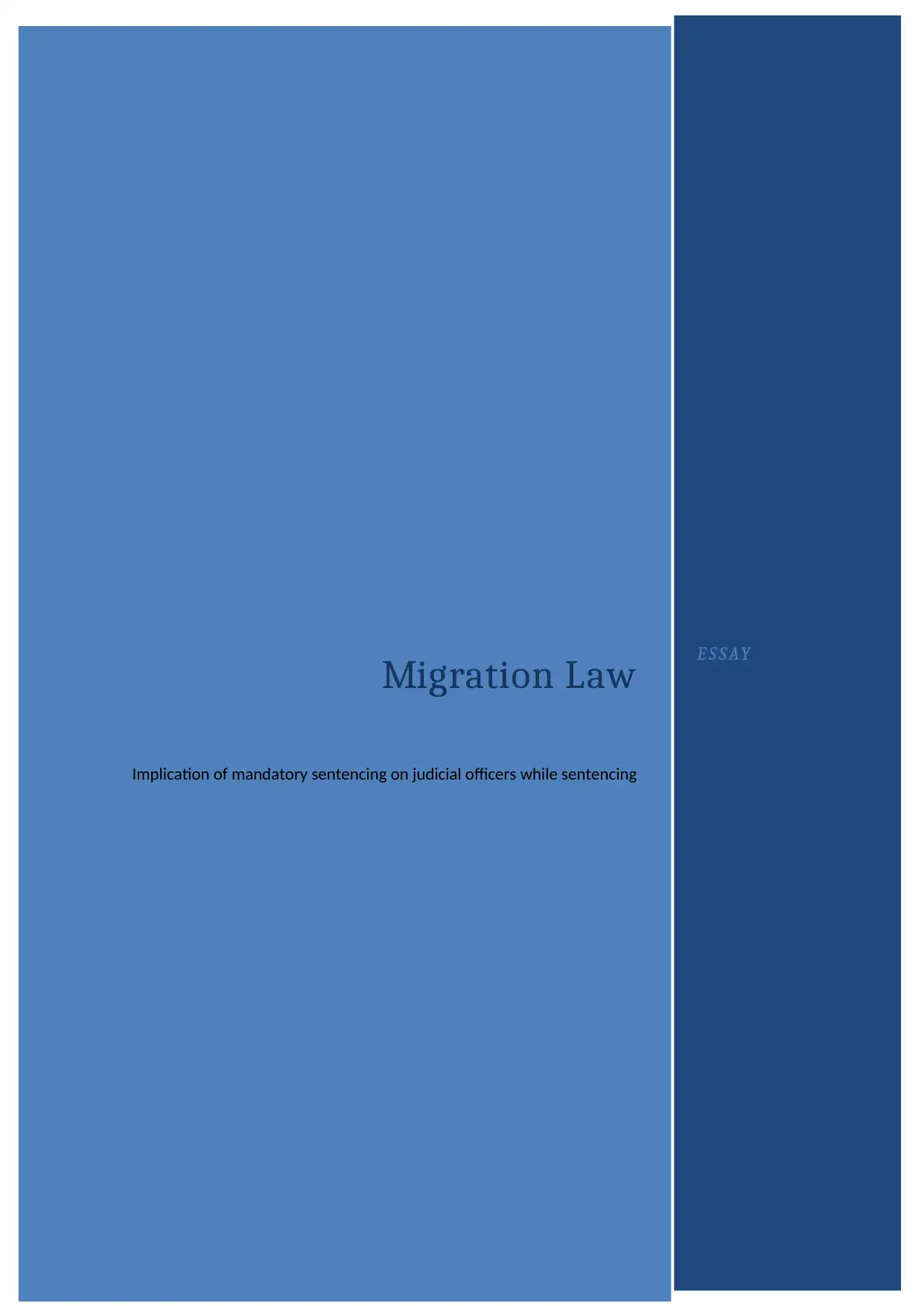
Migration Law
Implication of mandatory sentencing on judicial officers while sentencing
ESSAY
Implication of mandatory sentencing on judicial officers while sentencing
ESSAY
Paraphrase This Document
Need a fresh take? Get an instant paraphrase of this document with our AI Paraphraser
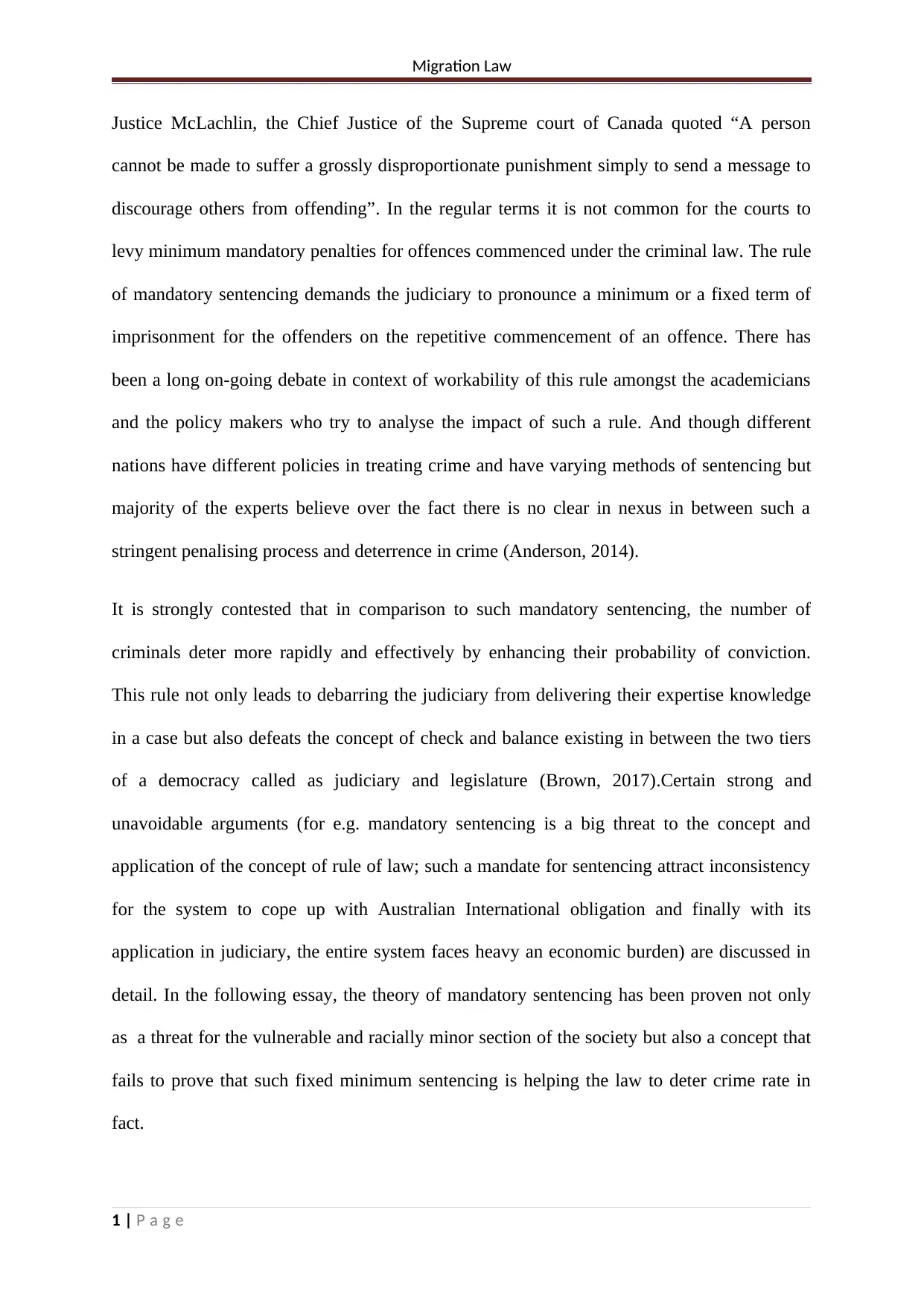
Migration Law
Justice McLachlin, the Chief Justice of the Supreme court of Canada quoted “A person
cannot be made to suffer a grossly disproportionate punishment simply to send a message to
discourage others from offending”. In the regular terms it is not common for the courts to
levy minimum mandatory penalties for offences commenced under the criminal law. The rule
of mandatory sentencing demands the judiciary to pronounce a minimum or a fixed term of
imprisonment for the offenders on the repetitive commencement of an offence. There has
been a long on-going debate in context of workability of this rule amongst the academicians
and the policy makers who try to analyse the impact of such a rule. And though different
nations have different policies in treating crime and have varying methods of sentencing but
majority of the experts believe over the fact there is no clear in nexus in between such a
stringent penalising process and deterrence in crime (Anderson, 2014).
It is strongly contested that in comparison to such mandatory sentencing, the number of
criminals deter more rapidly and effectively by enhancing their probability of conviction.
This rule not only leads to debarring the judiciary from delivering their expertise knowledge
in a case but also defeats the concept of check and balance existing in between the two tiers
of a democracy called as judiciary and legislature (Brown, 2017).Certain strong and
unavoidable arguments (for e.g. mandatory sentencing is a big threat to the concept and
application of the concept of rule of law; such a mandate for sentencing attract inconsistency
for the system to cope up with Australian International obligation and finally with its
application in judiciary, the entire system faces heavy an economic burden) are discussed in
detail. In the following essay, the theory of mandatory sentencing has been proven not only
as a threat for the vulnerable and racially minor section of the society but also a concept that
fails to prove that such fixed minimum sentencing is helping the law to deter crime rate in
fact.
1 | P a g e
Justice McLachlin, the Chief Justice of the Supreme court of Canada quoted “A person
cannot be made to suffer a grossly disproportionate punishment simply to send a message to
discourage others from offending”. In the regular terms it is not common for the courts to
levy minimum mandatory penalties for offences commenced under the criminal law. The rule
of mandatory sentencing demands the judiciary to pronounce a minimum or a fixed term of
imprisonment for the offenders on the repetitive commencement of an offence. There has
been a long on-going debate in context of workability of this rule amongst the academicians
and the policy makers who try to analyse the impact of such a rule. And though different
nations have different policies in treating crime and have varying methods of sentencing but
majority of the experts believe over the fact there is no clear in nexus in between such a
stringent penalising process and deterrence in crime (Anderson, 2014).
It is strongly contested that in comparison to such mandatory sentencing, the number of
criminals deter more rapidly and effectively by enhancing their probability of conviction.
This rule not only leads to debarring the judiciary from delivering their expertise knowledge
in a case but also defeats the concept of check and balance existing in between the two tiers
of a democracy called as judiciary and legislature (Brown, 2017).Certain strong and
unavoidable arguments (for e.g. mandatory sentencing is a big threat to the concept and
application of the concept of rule of law; such a mandate for sentencing attract inconsistency
for the system to cope up with Australian International obligation and finally with its
application in judiciary, the entire system faces heavy an economic burden) are discussed in
detail. In the following essay, the theory of mandatory sentencing has been proven not only
as a threat for the vulnerable and racially minor section of the society but also a concept that
fails to prove that such fixed minimum sentencing is helping the law to deter crime rate in
fact.
1 | P a g e
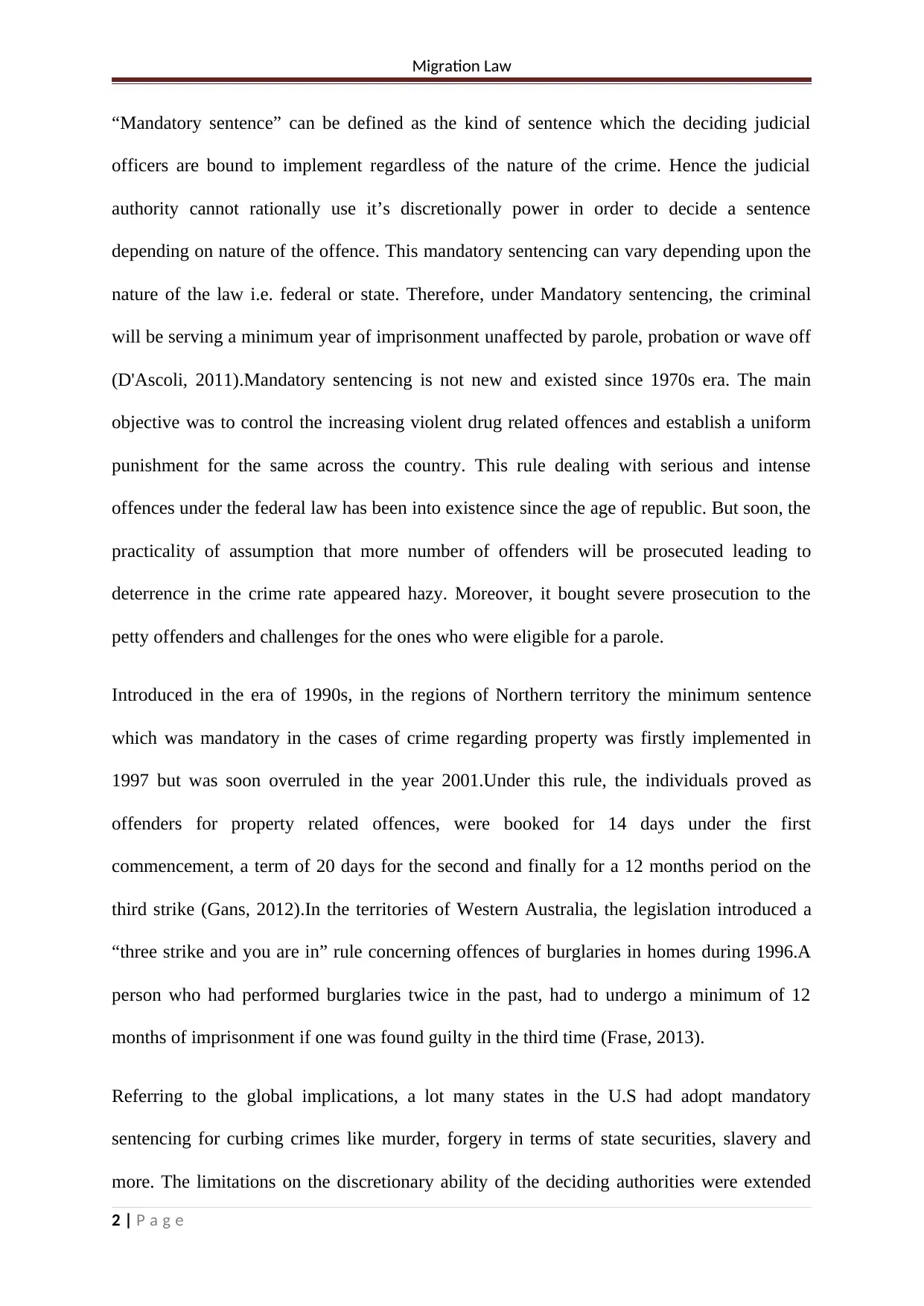
Migration Law
“Mandatory sentence” can be defined as the kind of sentence which the deciding judicial
officers are bound to implement regardless of the nature of the crime. Hence the judicial
authority cannot rationally use it’s discretionally power in order to decide a sentence
depending on nature of the offence. This mandatory sentencing can vary depending upon the
nature of the law i.e. federal or state. Therefore, under Mandatory sentencing, the criminal
will be serving a minimum year of imprisonment unaffected by parole, probation or wave off
(D'Ascoli, 2011).Mandatory sentencing is not new and existed since 1970s era. The main
objective was to control the increasing violent drug related offences and establish a uniform
punishment for the same across the country. This rule dealing with serious and intense
offences under the federal law has been into existence since the age of republic. But soon, the
practicality of assumption that more number of offenders will be prosecuted leading to
deterrence in the crime rate appeared hazy. Moreover, it bought severe prosecution to the
petty offenders and challenges for the ones who were eligible for a parole.
Introduced in the era of 1990s, in the regions of Northern territory the minimum sentence
which was mandatory in the cases of crime regarding property was firstly implemented in
1997 but was soon overruled in the year 2001.Under this rule, the individuals proved as
offenders for property related offences, were booked for 14 days under the first
commencement, a term of 20 days for the second and finally for a 12 months period on the
third strike (Gans, 2012).In the territories of Western Australia, the legislation introduced a
“three strike and you are in” rule concerning offences of burglaries in homes during 1996.A
person who had performed burglaries twice in the past, had to undergo a minimum of 12
months of imprisonment if one was found guilty in the third time (Frase, 2013).
Referring to the global implications, a lot many states in the U.S had adopt mandatory
sentencing for curbing crimes like murder, forgery in terms of state securities, slavery and
more. The limitations on the discretionary ability of the deciding authorities were extended
2 | P a g e
“Mandatory sentence” can be defined as the kind of sentence which the deciding judicial
officers are bound to implement regardless of the nature of the crime. Hence the judicial
authority cannot rationally use it’s discretionally power in order to decide a sentence
depending on nature of the offence. This mandatory sentencing can vary depending upon the
nature of the law i.e. federal or state. Therefore, under Mandatory sentencing, the criminal
will be serving a minimum year of imprisonment unaffected by parole, probation or wave off
(D'Ascoli, 2011).Mandatory sentencing is not new and existed since 1970s era. The main
objective was to control the increasing violent drug related offences and establish a uniform
punishment for the same across the country. This rule dealing with serious and intense
offences under the federal law has been into existence since the age of republic. But soon, the
practicality of assumption that more number of offenders will be prosecuted leading to
deterrence in the crime rate appeared hazy. Moreover, it bought severe prosecution to the
petty offenders and challenges for the ones who were eligible for a parole.
Introduced in the era of 1990s, in the regions of Northern territory the minimum sentence
which was mandatory in the cases of crime regarding property was firstly implemented in
1997 but was soon overruled in the year 2001.Under this rule, the individuals proved as
offenders for property related offences, were booked for 14 days under the first
commencement, a term of 20 days for the second and finally for a 12 months period on the
third strike (Gans, 2012).In the territories of Western Australia, the legislation introduced a
“three strike and you are in” rule concerning offences of burglaries in homes during 1996.A
person who had performed burglaries twice in the past, had to undergo a minimum of 12
months of imprisonment if one was found guilty in the third time (Frase, 2013).
Referring to the global implications, a lot many states in the U.S had adopt mandatory
sentencing for curbing crimes like murder, forgery in terms of state securities, slavery and
more. The limitations on the discretionary ability of the deciding authorities were extended
2 | P a g e
⊘ This is a preview!⊘
Do you want full access?
Subscribe today to unlock all pages.

Trusted by 1+ million students worldwide
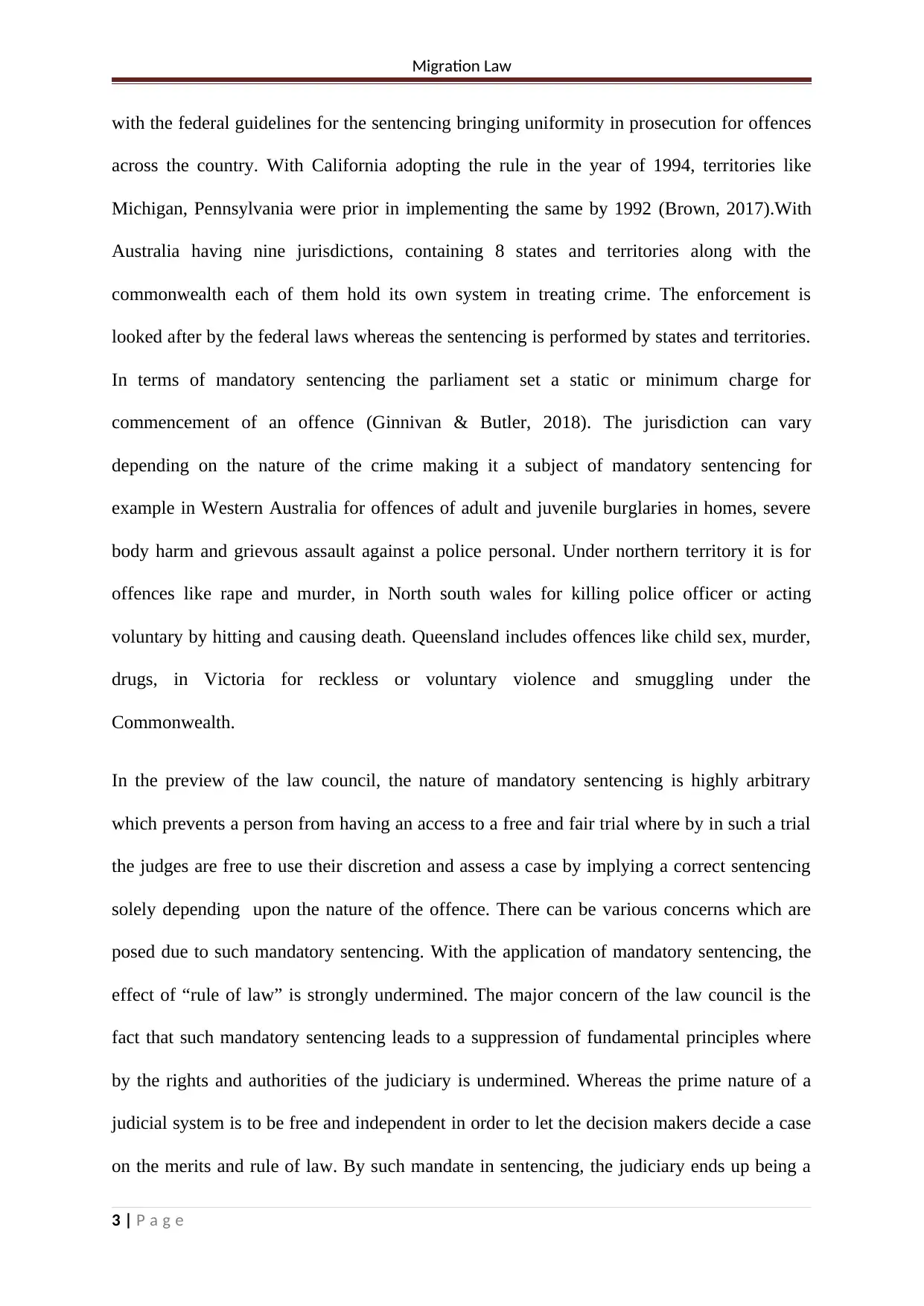
Migration Law
with the federal guidelines for the sentencing bringing uniformity in prosecution for offences
across the country. With California adopting the rule in the year of 1994, territories like
Michigan, Pennsylvania were prior in implementing the same by 1992 (Brown, 2017).With
Australia having nine jurisdictions, containing 8 states and territories along with the
commonwealth each of them hold its own system in treating crime. The enforcement is
looked after by the federal laws whereas the sentencing is performed by states and territories.
In terms of mandatory sentencing the parliament set a static or minimum charge for
commencement of an offence (Ginnivan & Butler, 2018). The jurisdiction can vary
depending on the nature of the crime making it a subject of mandatory sentencing for
example in Western Australia for offences of adult and juvenile burglaries in homes, severe
body harm and grievous assault against a police personal. Under northern territory it is for
offences like rape and murder, in North south wales for killing police officer or acting
voluntary by hitting and causing death. Queensland includes offences like child sex, murder,
drugs, in Victoria for reckless or voluntary violence and smuggling under the
Commonwealth.
In the preview of the law council, the nature of mandatory sentencing is highly arbitrary
which prevents a person from having an access to a free and fair trial where by in such a trial
the judges are free to use their discretion and assess a case by implying a correct sentencing
solely depending upon the nature of the offence. There can be various concerns which are
posed due to such mandatory sentencing. With the application of mandatory sentencing, the
effect of “rule of law” is strongly undermined. The major concern of the law council is the
fact that such mandatory sentencing leads to a suppression of fundamental principles where
by the rights and authorities of the judiciary is undermined. Whereas the prime nature of a
judicial system is to be free and independent in order to let the decision makers decide a case
on the merits and rule of law. By such mandate in sentencing, the judiciary ends up being a
3 | P a g e
with the federal guidelines for the sentencing bringing uniformity in prosecution for offences
across the country. With California adopting the rule in the year of 1994, territories like
Michigan, Pennsylvania were prior in implementing the same by 1992 (Brown, 2017).With
Australia having nine jurisdictions, containing 8 states and territories along with the
commonwealth each of them hold its own system in treating crime. The enforcement is
looked after by the federal laws whereas the sentencing is performed by states and territories.
In terms of mandatory sentencing the parliament set a static or minimum charge for
commencement of an offence (Ginnivan & Butler, 2018). The jurisdiction can vary
depending on the nature of the crime making it a subject of mandatory sentencing for
example in Western Australia for offences of adult and juvenile burglaries in homes, severe
body harm and grievous assault against a police personal. Under northern territory it is for
offences like rape and murder, in North south wales for killing police officer or acting
voluntary by hitting and causing death. Queensland includes offences like child sex, murder,
drugs, in Victoria for reckless or voluntary violence and smuggling under the
Commonwealth.
In the preview of the law council, the nature of mandatory sentencing is highly arbitrary
which prevents a person from having an access to a free and fair trial where by in such a trial
the judges are free to use their discretion and assess a case by implying a correct sentencing
solely depending upon the nature of the offence. There can be various concerns which are
posed due to such mandatory sentencing. With the application of mandatory sentencing, the
effect of “rule of law” is strongly undermined. The major concern of the law council is the
fact that such mandatory sentencing leads to a suppression of fundamental principles where
by the rights and authorities of the judiciary is undermined. Whereas the prime nature of a
judicial system is to be free and independent in order to let the decision makers decide a case
on the merits and rule of law. By such mandate in sentencing, the judiciary ends up being a
3 | P a g e
Paraphrase This Document
Need a fresh take? Get an instant paraphrase of this document with our AI Paraphraser
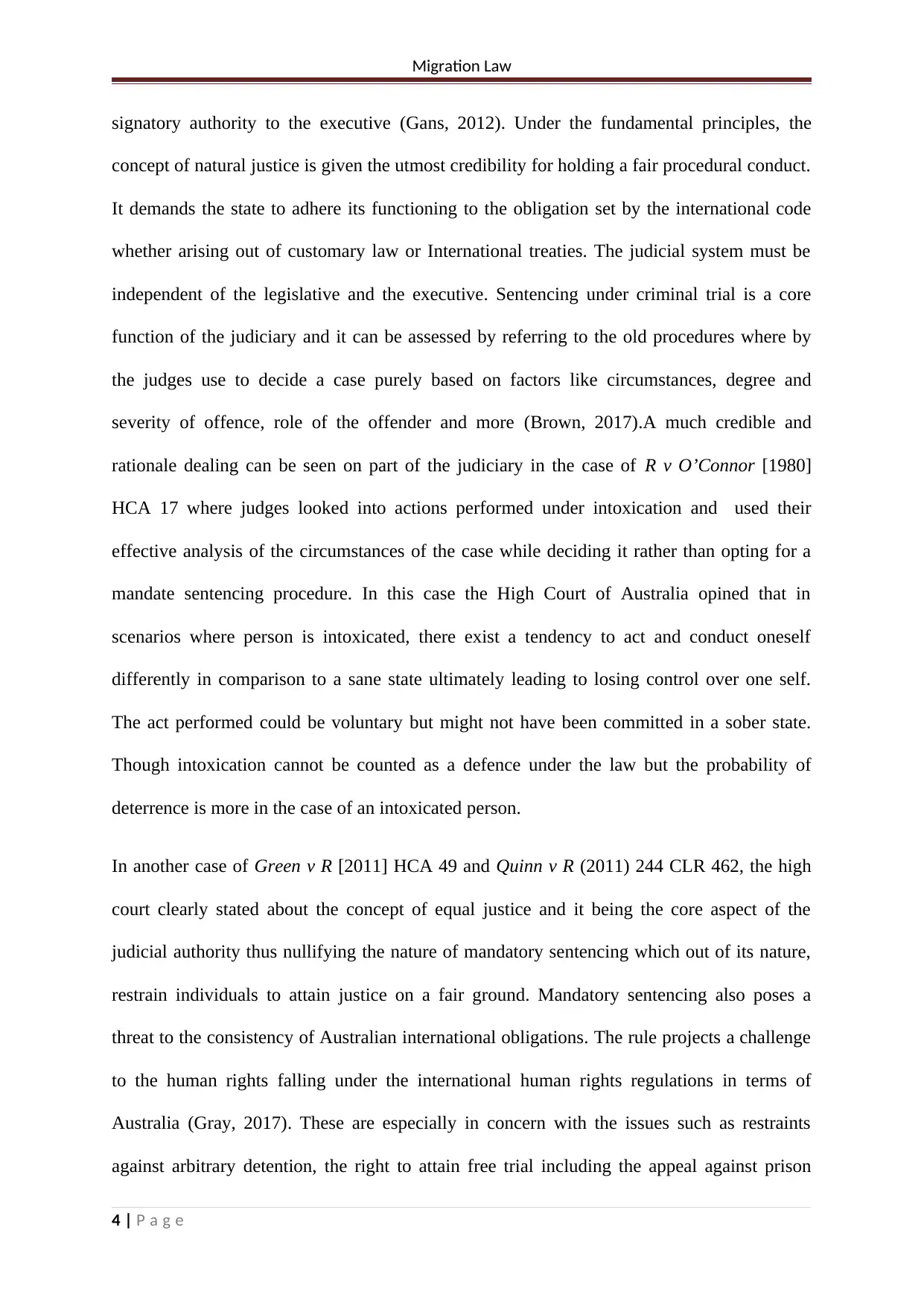
Migration Law
signatory authority to the executive (Gans, 2012). Under the fundamental principles, the
concept of natural justice is given the utmost credibility for holding a fair procedural conduct.
It demands the state to adhere its functioning to the obligation set by the international code
whether arising out of customary law or International treaties. The judicial system must be
independent of the legislative and the executive. Sentencing under criminal trial is a core
function of the judiciary and it can be assessed by referring to the old procedures where by
the judges use to decide a case purely based on factors like circumstances, degree and
severity of offence, role of the offender and more (Brown, 2017).A much credible and
rationale dealing can be seen on part of the judiciary in the case of R v O’Connor [1980]
HCA 17 where judges looked into actions performed under intoxication and used their
effective analysis of the circumstances of the case while deciding it rather than opting for a
mandate sentencing procedure. In this case the High Court of Australia opined that in
scenarios where person is intoxicated, there exist a tendency to act and conduct oneself
differently in comparison to a sane state ultimately leading to losing control over one self.
The act performed could be voluntary but might not have been committed in a sober state.
Though intoxication cannot be counted as a defence under the law but the probability of
deterrence is more in the case of an intoxicated person.
In another case of Green v R [2011] HCA 49 and Quinn v R (2011) 244 CLR 462, the high
court clearly stated about the concept of equal justice and it being the core aspect of the
judicial authority thus nullifying the nature of mandatory sentencing which out of its nature,
restrain individuals to attain justice on a fair ground. Mandatory sentencing also poses a
threat to the consistency of Australian international obligations. The rule projects a challenge
to the human rights falling under the international human rights regulations in terms of
Australia (Gray, 2017). These are especially in concern with the issues such as restraints
against arbitrary detention, the right to attain free trial including the appeal against prison
4 | P a g e
signatory authority to the executive (Gans, 2012). Under the fundamental principles, the
concept of natural justice is given the utmost credibility for holding a fair procedural conduct.
It demands the state to adhere its functioning to the obligation set by the international code
whether arising out of customary law or International treaties. The judicial system must be
independent of the legislative and the executive. Sentencing under criminal trial is a core
function of the judiciary and it can be assessed by referring to the old procedures where by
the judges use to decide a case purely based on factors like circumstances, degree and
severity of offence, role of the offender and more (Brown, 2017).A much credible and
rationale dealing can be seen on part of the judiciary in the case of R v O’Connor [1980]
HCA 17 where judges looked into actions performed under intoxication and used their
effective analysis of the circumstances of the case while deciding it rather than opting for a
mandate sentencing procedure. In this case the High Court of Australia opined that in
scenarios where person is intoxicated, there exist a tendency to act and conduct oneself
differently in comparison to a sane state ultimately leading to losing control over one self.
The act performed could be voluntary but might not have been committed in a sober state.
Though intoxication cannot be counted as a defence under the law but the probability of
deterrence is more in the case of an intoxicated person.
In another case of Green v R [2011] HCA 49 and Quinn v R (2011) 244 CLR 462, the high
court clearly stated about the concept of equal justice and it being the core aspect of the
judicial authority thus nullifying the nature of mandatory sentencing which out of its nature,
restrain individuals to attain justice on a fair ground. Mandatory sentencing also poses a
threat to the consistency of Australian international obligations. The rule projects a challenge
to the human rights falling under the international human rights regulations in terms of
Australia (Gray, 2017). These are especially in concern with the issues such as restraints
against arbitrary detention, the right to attain free trial including the appeal against prison
4 | P a g e
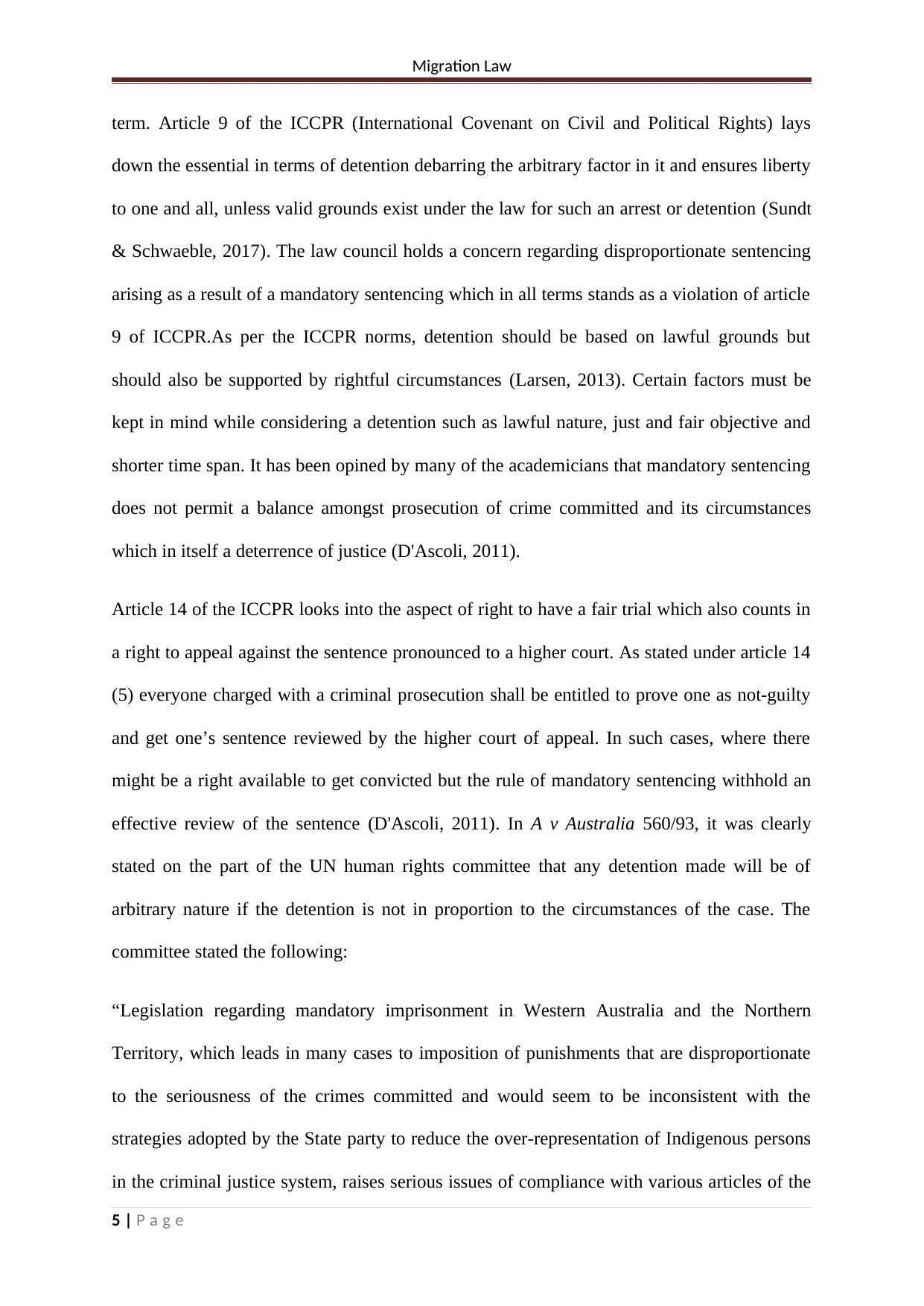
Migration Law
term. Article 9 of the ICCPR (International Covenant on Civil and Political Rights) lays
down the essential in terms of detention debarring the arbitrary factor in it and ensures liberty
to one and all, unless valid grounds exist under the law for such an arrest or detention (Sundt
& Schwaeble, 2017). The law council holds a concern regarding disproportionate sentencing
arising as a result of a mandatory sentencing which in all terms stands as a violation of article
9 of ICCPR.As per the ICCPR norms, detention should be based on lawful grounds but
should also be supported by rightful circumstances (Larsen, 2013). Certain factors must be
kept in mind while considering a detention such as lawful nature, just and fair objective and
shorter time span. It has been opined by many of the academicians that mandatory sentencing
does not permit a balance amongst prosecution of crime committed and its circumstances
which in itself a deterrence of justice (D'Ascoli, 2011).
Article 14 of the ICCPR looks into the aspect of right to have a fair trial which also counts in
a right to appeal against the sentence pronounced to a higher court. As stated under article 14
(5) everyone charged with a criminal prosecution shall be entitled to prove one as not-guilty
and get one’s sentence reviewed by the higher court of appeal. In such cases, where there
might be a right available to get convicted but the rule of mandatory sentencing withhold an
effective review of the sentence (D'Ascoli, 2011). In A v Australia 560/93, it was clearly
stated on the part of the UN human rights committee that any detention made will be of
arbitrary nature if the detention is not in proportion to the circumstances of the case. The
committee stated the following:
“Legislation regarding mandatory imprisonment in Western Australia and the Northern
Territory, which leads in many cases to imposition of punishments that are disproportionate
to the seriousness of the crimes committed and would seem to be inconsistent with the
strategies adopted by the State party to reduce the over-representation of Indigenous persons
in the criminal justice system, raises serious issues of compliance with various articles of the
5 | P a g e
term. Article 9 of the ICCPR (International Covenant on Civil and Political Rights) lays
down the essential in terms of detention debarring the arbitrary factor in it and ensures liberty
to one and all, unless valid grounds exist under the law for such an arrest or detention (Sundt
& Schwaeble, 2017). The law council holds a concern regarding disproportionate sentencing
arising as a result of a mandatory sentencing which in all terms stands as a violation of article
9 of ICCPR.As per the ICCPR norms, detention should be based on lawful grounds but
should also be supported by rightful circumstances (Larsen, 2013). Certain factors must be
kept in mind while considering a detention such as lawful nature, just and fair objective and
shorter time span. It has been opined by many of the academicians that mandatory sentencing
does not permit a balance amongst prosecution of crime committed and its circumstances
which in itself a deterrence of justice (D'Ascoli, 2011).
Article 14 of the ICCPR looks into the aspect of right to have a fair trial which also counts in
a right to appeal against the sentence pronounced to a higher court. As stated under article 14
(5) everyone charged with a criminal prosecution shall be entitled to prove one as not-guilty
and get one’s sentence reviewed by the higher court of appeal. In such cases, where there
might be a right available to get convicted but the rule of mandatory sentencing withhold an
effective review of the sentence (D'Ascoli, 2011). In A v Australia 560/93, it was clearly
stated on the part of the UN human rights committee that any detention made will be of
arbitrary nature if the detention is not in proportion to the circumstances of the case. The
committee stated the following:
“Legislation regarding mandatory imprisonment in Western Australia and the Northern
Territory, which leads in many cases to imposition of punishments that are disproportionate
to the seriousness of the crimes committed and would seem to be inconsistent with the
strategies adopted by the State party to reduce the over-representation of Indigenous persons
in the criminal justice system, raises serious issues of compliance with various articles of the
5 | P a g e
⊘ This is a preview!⊘
Do you want full access?
Subscribe today to unlock all pages.

Trusted by 1+ million students worldwide
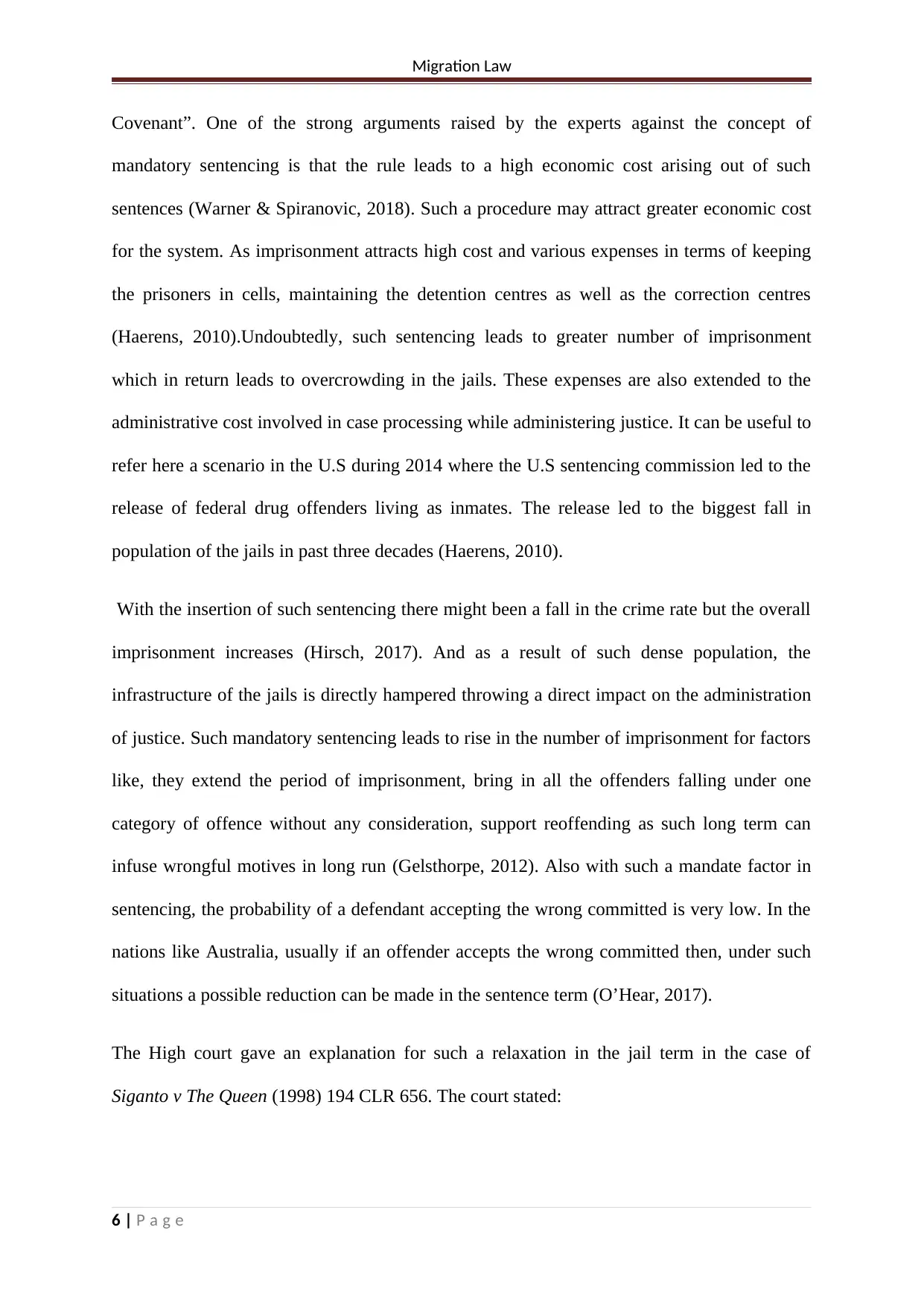
Migration Law
Covenant”. One of the strong arguments raised by the experts against the concept of
mandatory sentencing is that the rule leads to a high economic cost arising out of such
sentences (Warner & Spiranovic, 2018). Such a procedure may attract greater economic cost
for the system. As imprisonment attracts high cost and various expenses in terms of keeping
the prisoners in cells, maintaining the detention centres as well as the correction centres
(Haerens, 2010).Undoubtedly, such sentencing leads to greater number of imprisonment
which in return leads to overcrowding in the jails. These expenses are also extended to the
administrative cost involved in case processing while administering justice. It can be useful to
refer here a scenario in the U.S during 2014 where the U.S sentencing commission led to the
release of federal drug offenders living as inmates. The release led to the biggest fall in
population of the jails in past three decades (Haerens, 2010).
With the insertion of such sentencing there might been a fall in the crime rate but the overall
imprisonment increases (Hirsch, 2017). And as a result of such dense population, the
infrastructure of the jails is directly hampered throwing a direct impact on the administration
of justice. Such mandatory sentencing leads to rise in the number of imprisonment for factors
like, they extend the period of imprisonment, bring in all the offenders falling under one
category of offence without any consideration, support reoffending as such long term can
infuse wrongful motives in long run (Gelsthorpe, 2012). Also with such a mandate factor in
sentencing, the probability of a defendant accepting the wrong committed is very low. In the
nations like Australia, usually if an offender accepts the wrong committed then, under such
situations a possible reduction can be made in the sentence term (O’Hear, 2017).
The High court gave an explanation for such a relaxation in the jail term in the case of
Siganto v The Queen (1998) 194 CLR 656. The court stated:
6 | P a g e
Covenant”. One of the strong arguments raised by the experts against the concept of
mandatory sentencing is that the rule leads to a high economic cost arising out of such
sentences (Warner & Spiranovic, 2018). Such a procedure may attract greater economic cost
for the system. As imprisonment attracts high cost and various expenses in terms of keeping
the prisoners in cells, maintaining the detention centres as well as the correction centres
(Haerens, 2010).Undoubtedly, such sentencing leads to greater number of imprisonment
which in return leads to overcrowding in the jails. These expenses are also extended to the
administrative cost involved in case processing while administering justice. It can be useful to
refer here a scenario in the U.S during 2014 where the U.S sentencing commission led to the
release of federal drug offenders living as inmates. The release led to the biggest fall in
population of the jails in past three decades (Haerens, 2010).
With the insertion of such sentencing there might been a fall in the crime rate but the overall
imprisonment increases (Hirsch, 2017). And as a result of such dense population, the
infrastructure of the jails is directly hampered throwing a direct impact on the administration
of justice. Such mandatory sentencing leads to rise in the number of imprisonment for factors
like, they extend the period of imprisonment, bring in all the offenders falling under one
category of offence without any consideration, support reoffending as such long term can
infuse wrongful motives in long run (Gelsthorpe, 2012). Also with such a mandate factor in
sentencing, the probability of a defendant accepting the wrong committed is very low. In the
nations like Australia, usually if an offender accepts the wrong committed then, under such
situations a possible reduction can be made in the sentence term (O’Hear, 2017).
The High court gave an explanation for such a relaxation in the jail term in the case of
Siganto v The Queen (1998) 194 CLR 656. The court stated:
6 | P a g e
Paraphrase This Document
Need a fresh take? Get an instant paraphrase of this document with our AI Paraphraser
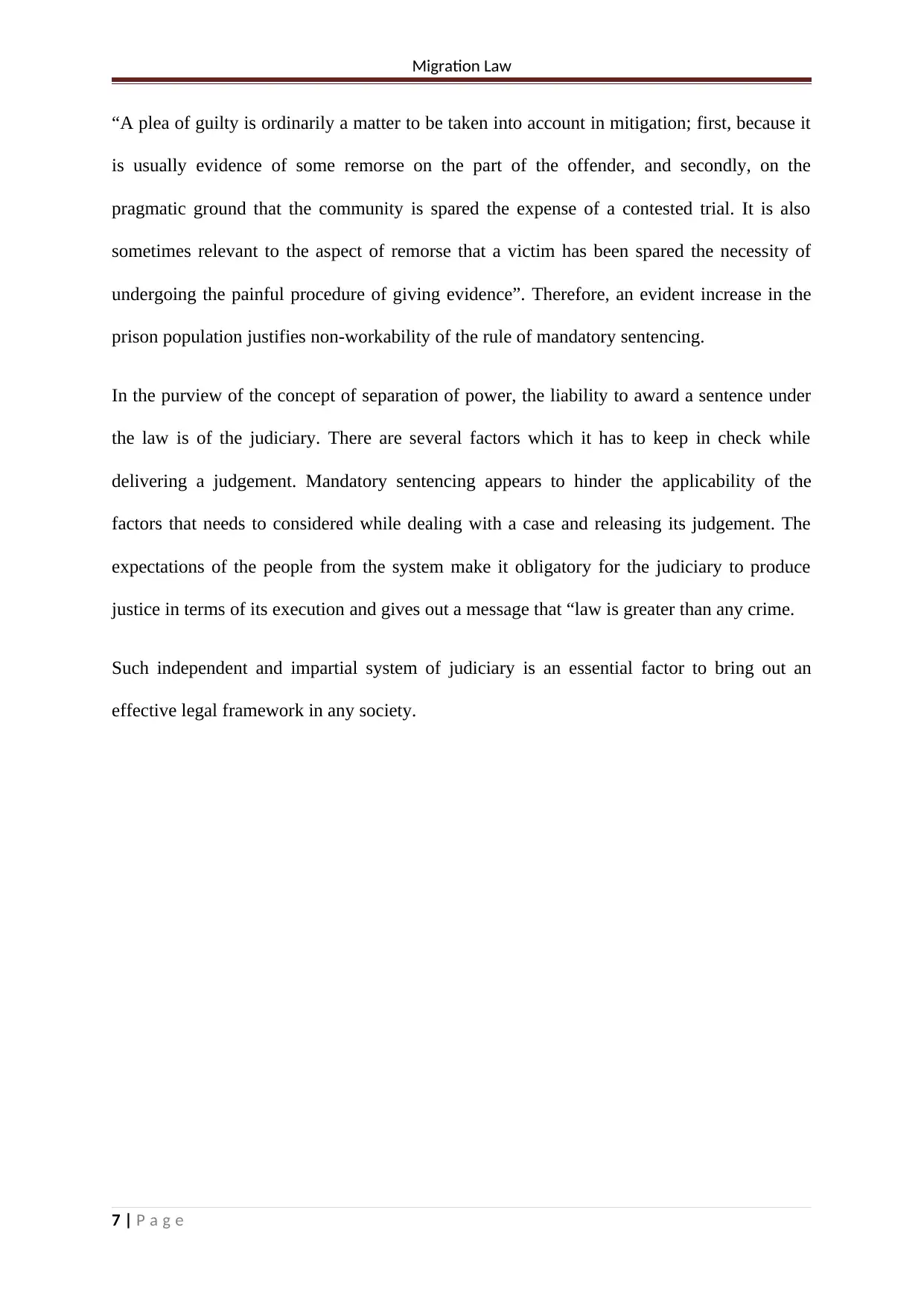
Migration Law
“A plea of guilty is ordinarily a matter to be taken into account in mitigation; first, because it
is usually evidence of some remorse on the part of the offender, and secondly, on the
pragmatic ground that the community is spared the expense of a contested trial. It is also
sometimes relevant to the aspect of remorse that a victim has been spared the necessity of
undergoing the painful procedure of giving evidence”. Therefore, an evident increase in the
prison population justifies non-workability of the rule of mandatory sentencing.
In the purview of the concept of separation of power, the liability to award a sentence under
the law is of the judiciary. There are several factors which it has to keep in check while
delivering a judgement. Mandatory sentencing appears to hinder the applicability of the
factors that needs to considered while dealing with a case and releasing its judgement. The
expectations of the people from the system make it obligatory for the judiciary to produce
justice in terms of its execution and gives out a message that “law is greater than any crime.
Such independent and impartial system of judiciary is an essential factor to bring out an
effective legal framework in any society.
7 | P a g e
“A plea of guilty is ordinarily a matter to be taken into account in mitigation; first, because it
is usually evidence of some remorse on the part of the offender, and secondly, on the
pragmatic ground that the community is spared the expense of a contested trial. It is also
sometimes relevant to the aspect of remorse that a victim has been spared the necessity of
undergoing the painful procedure of giving evidence”. Therefore, an evident increase in the
prison population justifies non-workability of the rule of mandatory sentencing.
In the purview of the concept of separation of power, the liability to award a sentence under
the law is of the judiciary. There are several factors which it has to keep in check while
delivering a judgement. Mandatory sentencing appears to hinder the applicability of the
factors that needs to considered while dealing with a case and releasing its judgement. The
expectations of the people from the system make it obligatory for the judiciary to produce
justice in terms of its execution and gives out a message that “law is greater than any crime.
Such independent and impartial system of judiciary is an essential factor to bring out an
effective legal framework in any society.
7 | P a g e
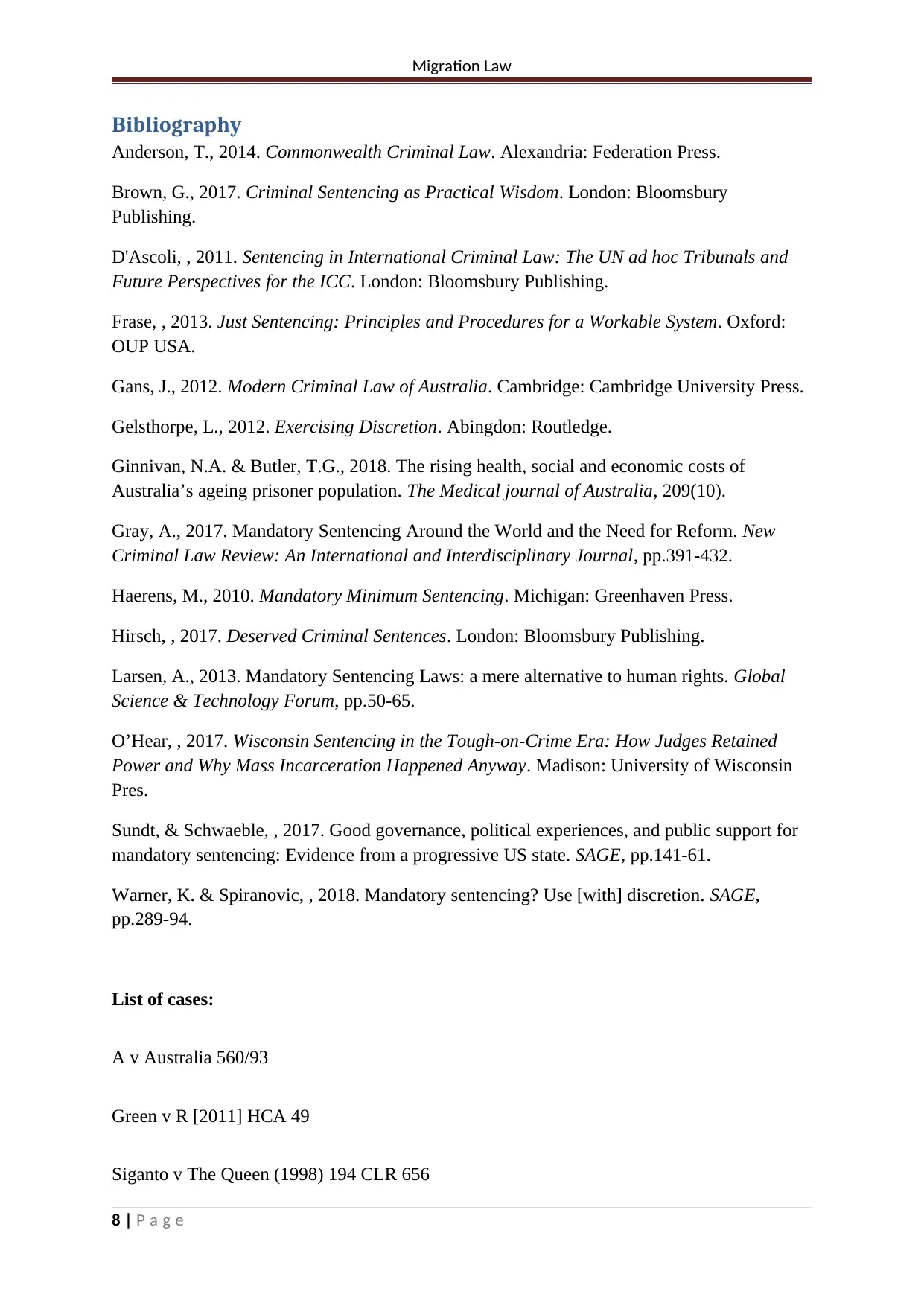
Migration Law
Bibliography
Anderson, T., 2014. Commonwealth Criminal Law. Alexandria: Federation Press.
Brown, G., 2017. Criminal Sentencing as Practical Wisdom. London: Bloomsbury
Publishing.
D'Ascoli, , 2011. Sentencing in International Criminal Law: The UN ad hoc Tribunals and
Future Perspectives for the ICC. London: Bloomsbury Publishing.
Frase, , 2013. Just Sentencing: Principles and Procedures for a Workable System. Oxford:
OUP USA.
Gans, J., 2012. Modern Criminal Law of Australia. Cambridge: Cambridge University Press.
Gelsthorpe, L., 2012. Exercising Discretion. Abingdon: Routledge.
Ginnivan, N.A. & Butler, T.G., 2018. The rising health, social and economic costs of
Australia’s ageing prisoner population. The Medical journal of Australia, 209(10).
Gray, A., 2017. Mandatory Sentencing Around the World and the Need for Reform. New
Criminal Law Review: An International and Interdisciplinary Journal, pp.391-432.
Haerens, M., 2010. Mandatory Minimum Sentencing. Michigan: Greenhaven Press.
Hirsch, , 2017. Deserved Criminal Sentences. London: Bloomsbury Publishing.
Larsen, A., 2013. Mandatory Sentencing Laws: a mere alternative to human rights. Global
Science & Technology Forum, pp.50-65.
O’Hear, , 2017. Wisconsin Sentencing in the Tough-on-Crime Era: How Judges Retained
Power and Why Mass Incarceration Happened Anyway. Madison: University of Wisconsin
Pres.
Sundt, & Schwaeble, , 2017. Good governance, political experiences, and public support for
mandatory sentencing: Evidence from a progressive US state. SAGE, pp.141-61.
Warner, K. & Spiranovic, , 2018. Mandatory sentencing? Use [with] discretion. SAGE,
pp.289-94.
List of cases:
A v Australia 560/93
Green v R [2011] HCA 49
Siganto v The Queen (1998) 194 CLR 656
8 | P a g e
Bibliography
Anderson, T., 2014. Commonwealth Criminal Law. Alexandria: Federation Press.
Brown, G., 2017. Criminal Sentencing as Practical Wisdom. London: Bloomsbury
Publishing.
D'Ascoli, , 2011. Sentencing in International Criminal Law: The UN ad hoc Tribunals and
Future Perspectives for the ICC. London: Bloomsbury Publishing.
Frase, , 2013. Just Sentencing: Principles and Procedures for a Workable System. Oxford:
OUP USA.
Gans, J., 2012. Modern Criminal Law of Australia. Cambridge: Cambridge University Press.
Gelsthorpe, L., 2012. Exercising Discretion. Abingdon: Routledge.
Ginnivan, N.A. & Butler, T.G., 2018. The rising health, social and economic costs of
Australia’s ageing prisoner population. The Medical journal of Australia, 209(10).
Gray, A., 2017. Mandatory Sentencing Around the World and the Need for Reform. New
Criminal Law Review: An International and Interdisciplinary Journal, pp.391-432.
Haerens, M., 2010. Mandatory Minimum Sentencing. Michigan: Greenhaven Press.
Hirsch, , 2017. Deserved Criminal Sentences. London: Bloomsbury Publishing.
Larsen, A., 2013. Mandatory Sentencing Laws: a mere alternative to human rights. Global
Science & Technology Forum, pp.50-65.
O’Hear, , 2017. Wisconsin Sentencing in the Tough-on-Crime Era: How Judges Retained
Power and Why Mass Incarceration Happened Anyway. Madison: University of Wisconsin
Pres.
Sundt, & Schwaeble, , 2017. Good governance, political experiences, and public support for
mandatory sentencing: Evidence from a progressive US state. SAGE, pp.141-61.
Warner, K. & Spiranovic, , 2018. Mandatory sentencing? Use [with] discretion. SAGE,
pp.289-94.
List of cases:
A v Australia 560/93
Green v R [2011] HCA 49
Siganto v The Queen (1998) 194 CLR 656
8 | P a g e
⊘ This is a preview!⊘
Do you want full access?
Subscribe today to unlock all pages.

Trusted by 1+ million students worldwide
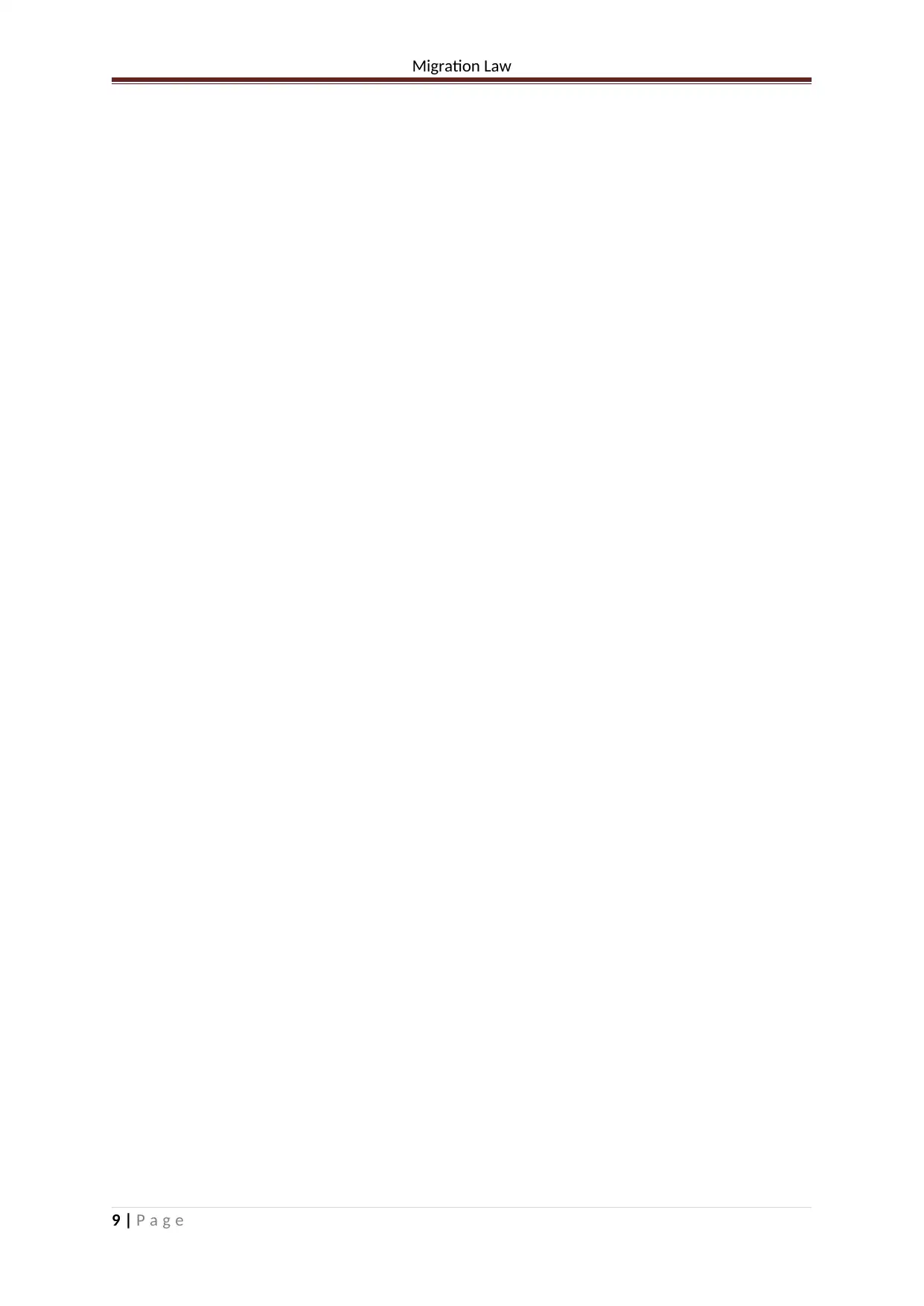
Migration Law
9 | P a g e
9 | P a g e
1 out of 10
Related Documents
Your All-in-One AI-Powered Toolkit for Academic Success.
+13062052269
info@desklib.com
Available 24*7 on WhatsApp / Email
![[object Object]](/_next/static/media/star-bottom.7253800d.svg)
Unlock your academic potential
Copyright © 2020–2026 A2Z Services. All Rights Reserved. Developed and managed by ZUCOL.




